Getting the right developers is tricky business. How can we know for real that an applicant has technical skills sufficient to meet the job requirements? Of course, a resume or interview provides a glimpse, but they never tell the whole story. That’s where online coding assessments come into play. These instruments equip you with the ability to test a candidate’s programming skills under real-life conditions and, therefore, make you better-informed decisions in advance. From streamlining your recruitment process to being sure your next hire is up for the challenge, coding assessments have shown themselves to be the answer.
How do you put these assessments to work, and why are they so valuable? Let’s break it down.
- What Are Online Coding Assessments?
- How Does Online Coding Assessment Software Work
- Comparison Between Traditional and Online AI Coding Assessment
- 8 Best Coding Assessment Makers for Trainers
- How to Create A Programming Assessment in OnlineExamMaker?
What Are Online Coding Assessments?
How do you measure someone’s technical abilities—specifically, a developer’s—without actually employing them yet? Here come online coding assessments. With companies under constant pressure to innovate in this constantly shifting tech landscape, online coding tests are rapidly gaining popularity as one of the most powerful ways to evaluate great talent.
Online coding tests are created to understand how capable candidates are of solving real-life coding challenges. The algorithmic problems to be solved, the debugging exercises—all these bring more understanding to the thought process of a developer and the technical know-how of an individual taking the test. The great thing is that one can make these tests personalized with the job’s exact needs while making sure he or she is able to access the most important skills for a team. Rather than being based solely on interviews or theoretical questions, these tests provide a practical way of seeing how candidates work on problems, under pressure, and write efficient code.
How Does Online Coding Assessment Software Work?
Want to know more about how these platforms operate? Just as they should, it’s. Usually, the process begins when recruiters or hiring managers create a test by choosing or customizing coding challenges representing the technical requirements for the job. Be it simple tasks or complex problems—the challenge would represent the ability levels they are looking for. Then, they will receive a link to complete the assessment within a time limit. The test environment often features real-time code execution, allowing candidates to write, run, and debug their code as the case may be in a professional setup. This gives a real coding experience where one can prove their coding skills.
When an assessment is completed, the platform automatically reviews the code to check for accuracy, efficiency, and structure. Some even go as far as guiding the hiring team through the insights into the problem-solving approach of the candidate and how they manage their time. Such reports give hiring teams a clear view of the candidates, their strengths, and what might need improvement, hence making the hiring decision highly data-driven.
Comparison Between Traditional and Online AI Coding Assessment
The process for conducting and processing coding assessment is very much different in the traditional way and also in an online AI-based platform.
Traditional coding assessment usually takes place with candidates in person and requires the candidate to solve problems on paper or a local machine, with solutions being reviewed by a hiring team. Professional experts in the field take plenty of time scanning through the code to ensure that the logic is right and efficient, hence this process is often time-consuming. Traditional assessments often come with a huge degree of access costs where the candidates are required to travel to certain locations or complete take-home assignments, which proves to be a great inconvenience to a good number of the candidates. In addition, the results obtained from the evaluation process are more subjective—results will differ based on how the evaluator views the information provided.
On the other hand, online AI-based coding assessments offer a much more flexible and efficient approach. These assessments can now be taken from any location at any time, allowing test takers to get into their own zone. This widens up the talent pool for companies since they are not constrained by geographical barriers. The AI-based assessments provide real coding environments for candidates to write, test, and debug their codes at that moment of time, hence mimicking coding experiences in real life. The evaluation process is automated, where AI looks at the correctness, efficiency, and overall quality of the code in relation to predefined test cases. This then gives immediate feedback, standardized grading, and reduces biases that could arise from manual evaluation.
In general, the AI-based code assessments help make recruitment fast, precise, and convenient, not only for companies but also for candidates.
8 Best Coding Assessment Makers for Trainers
- 1. OnlineExamMaker
- 2. CodeSignal
- 3. HackerRank
- 4. Codility
- 5. TestGorilla
- 6. Codebunk
- 7. DevSkiller
- 8. Mettl
1. OnlineExamMaker
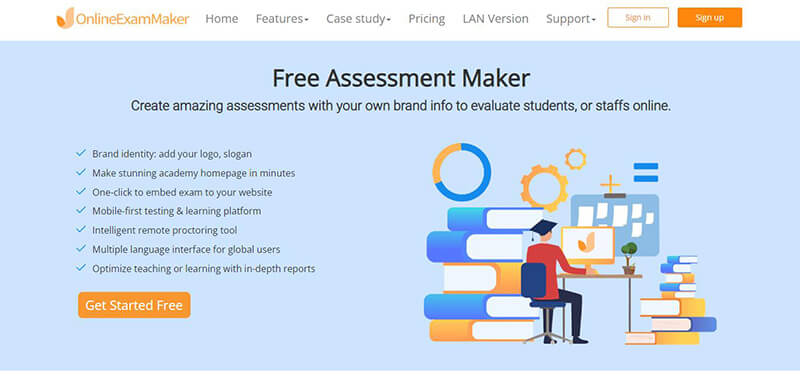
G2 Rating: 4.7/5
Top Features:
• Trainers can easily create and manage coding tests that include a variety of question types.
• The platform allows for real-time monitoring to prevent cheating during the assessment.
• Cloud-based, assessed on any device, any place.
• AI exam proctor to prevent cheating activities during the exam
• Comprehensive performance reports to monitor the progress of students and their skill development.
• OnlineExamMaker facilitates AI automatic grading, thus evaluation becomes super easy.
OnlineExamMaker is an all-in-one tool for any trainer to develop, deliver, and effectively evaluate coding tests. It gives users an easy-to-use platform to create customized tests with a variety of questions, ranging from multiple-choice to hands-on coding questions. Monitoring in real time ensures a secure testing environment. At the same time, detailed reports shed light on student performance, which assists trainers when tailoring feedback. An automatic grading system allows for an efficient and error-free way to prepare grades. It is a top choice among educators and trainers seeking a smooth, low-cost solution for coding assessments.
Create Your Next Quiz/Exam with OnlineExamMaker
2. CodeSignal
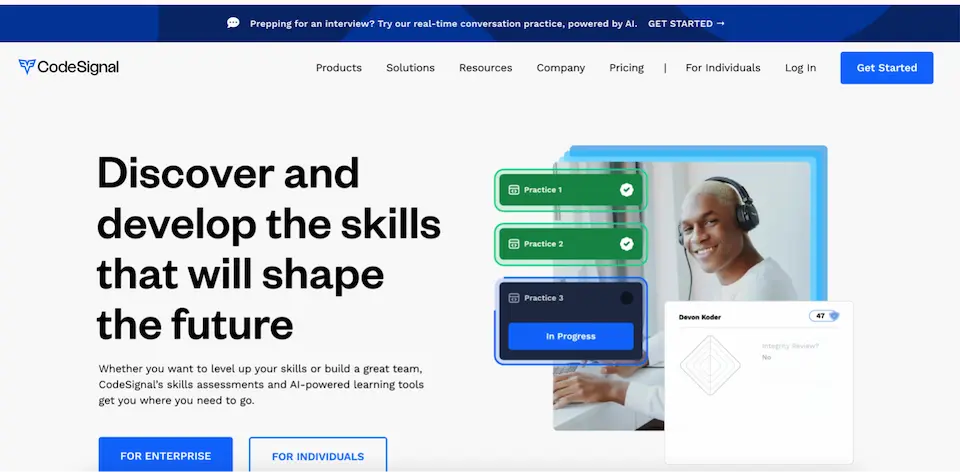
Capterra Rating: 4.6/5
Top Features:
• Pre-defined coding challenges offered by CodeSignal in several programming languages.
• Provides detailed performance reports, which are easily analyzed for candidate skills.
• Feedback in real-time is possible, so it will allow candidates to test and debug code during an assessment.
• Consists of a number of anti-cheating features to ensure the integrity of the test.
CodeSignal is a web-based skills assessment platform that is widely used by trainers and companies to test developers’ coding skills in numerous programming languages. It has an intuitive interface that lets trainers create custom assessments or use premade coding challenges. Further, the platform’s elaborative reporting helps identify performances at the most granular level, therefore making it easy to find good performers.
Real-life scenarios are well simulated in the CodeSignal testing environment, allowing candidates to ensure code works at the very moment of writing—in other words, a real development environment. Anti-cheating measures enhance fair and secure assessments, making this tool an optimal solution for any trainer willing to deliver accurate and trustworthy coding tests.
3. HackerRank
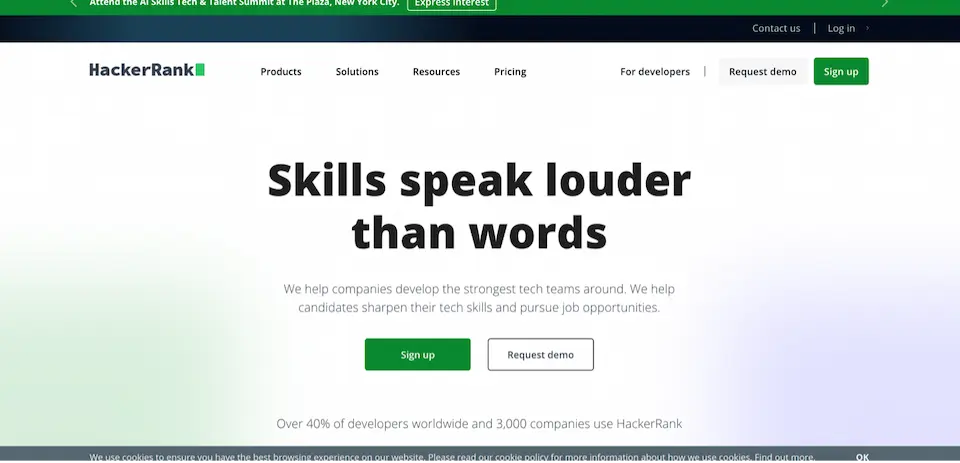
Capterra Rating: 4.5/5
Top Features:
• Offers a vast library of coding challenges, customizable for different skill levels.
• It supplies state-of-the-art analytics for assessing problem-solving skills and code efficiency.
• Supports live coding interviews, enabling interactive training sessions.
• Anti-plagiarism features secure the fairness and integrity of the task assessments.
HackerRank is a popular platform for coding assessments that equips trainers with real-world, hands-on assessments of developers’ abilities. The platform offers an extensive library with pre-built tasks that trainers can use to configure their own assessments, tailored to a given candidate’s skills or even roles. All of these comprehensive analytics lead to deep insights on problem-solving ability and code efficiency for the candidate, giving trainers an idea of their student’s strength and weakness areas. Moreover, this live coding interview feature enables interactive assessments, thus being ideal for hands-on training environments. Anti-plagiarism tools by HackerRank ensure that the coding assessments are both fair and secure.
4. Codility
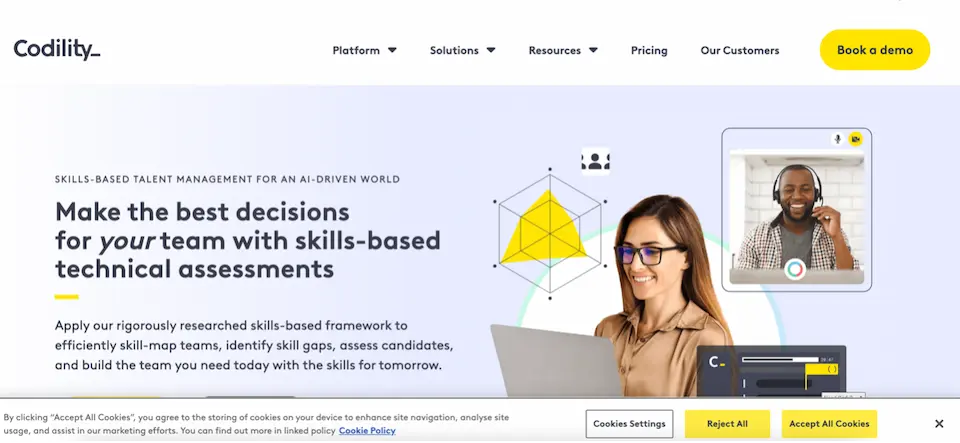
Capterra Rating: 4.6/5
• Enables trainers to design coding assessments tailored to different skill levels and programming languages.
• It has automated grading to reduce time and bring down the impact of manual errors.
• Supports environments that allow candidates to execute and test code.
• Built-in anti-cheating measures, like screen recording, ensure secure testing.
Codility is being considered as a top-notch platform for trainers who are looking forward to conducting customized coding tests in many programming languages and varying levels of problems. The automatic grading that the platform facilitates allows trainers to focus more on teaching rather than the evaluation part, as the platform rapidly goes through the submissions based on correctness and efficiency.
Real-time coding environments also allow candidates to run and debug code during assessments. Its anti-cheating features include screen recording and browser lock, hence, making Codility a great choice for coding trainers due to its fair and transparent assessment process.
5. TestGorilla

Capterra Rating: 4.2/5
Top Features:
• Pre-generated coding assessments, which can be tailored to the skill level.
• Allows trainers to generate automated reports with detailed performance insights.
• Trainers can easily prepare coding tests in several programming languages.
• Smoothly integrates with all kinds of hiring tools, and CRM.
TestGorilla is an all-in-one coding assessment tool that allows trainers to create and deliver coding challenges in a snap using any programming language they want. It enables the trainer to choose from a wide variety in a large, ready-made test library or even customize according to the level of skills and knowledge that the student requires. Automated performance reports help trainers identify learning gaps and areas where improvement is required, thereby ensuring a clear path for student development.
TestGorilla also provides for tight integration with a variety of third-party tools, greatly simplifying the process for trainers in managing the assessment procedures. This is a very good option in terms of evaluating coders for educators and trainers who are looking to do it faster, always with the focus that TestGorilla puts on usability and detailed reporting.
6. Codebunk
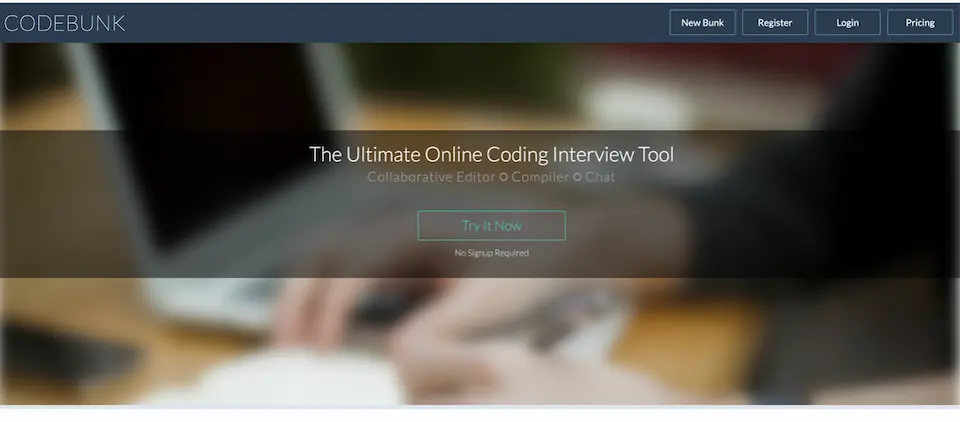
Capterra Rating: 5.0/5
Top Features:
• Codebunk offers real-time collaborative coding environments for interviews and assessments.
• Supports multiple programming languages, making it suitable for a range of training needs.
• Utilize readymade templates or create personalized coding challenges for students.
• In-depth feedback about candidate performance during the coding session.
Codebunk is an interactive assessment tool for coding, targeting trainers who wish to hold on-the-fly coding interviews and tests. It currently supports a couple of programming languages and is adaptable to different training environments. Trainers can use the readymade template by the platform or can even create custom coding challenges of their own; it is therefore a flexible way of designing an assessment. In this regard, Codebunk provides for collaboration, making it appropriate in conducting pair coding exercises or live assessments. With this and its detailed feedback mechanism, it would be easy for the trainers to fathom how students approach coding problems and offer them real, actionable inside tips on how to improve their learning experience.
7. DevSkiller

Capterra Rating: 4.8/5
Top Features:
• Real-world coding tasks based on actual work scenarios, perfect for practical training.
• Supports many tech stacks, allowing versatile assessments.
• Offers detailed performance reports to track progress over time.
• Trainers can easily grade and rank student performance through the TalentScore system.
DevSkiller is designed for trainers who want to assess students in relation to coding skills according to real-life tasks by simulating actual development environments. It supports various tech stacks, and the way it’s built makes it compatible with different training programs. Trainers can either customize the assessment offered by Deft within its system or use the pre-built tasks on the system to identify key skills.
With DevSkiller, you can access detailed reports regarding the performance put forward by your candidates. It has a TalentScore system where it ranks all your participants based on their ability to code. Life is hence made easier for the trainers because they can easily identify areas of top performers and where to improve, which enhances the overall learning experience.
8. Mettl

Capterra Rating: 4.4/5
Top Features:
• A wide range of coding assessments over a number of languages and frameworks.
• Customizable test templates that allow the trainers to commit and perform assessments for particular needs.
• Anti-cheating features such as webcam proctoring and browser lockdown.
• Detailed reports help trainers track progress and measure improvement over time.
Mettl is a popular assessment platform that reviews the strength of one’s coding skills, it is used by many trainers and educators as a means to evaluate and track their learners. Today, Mettl supports a variety of programming languages and provides the ability to create tailored templates based on your needs. Trainers leverage the powerful reporting capabilities in Mettl, insight from the candidate’s performance, and pointing out what one needs to work on.
The platform boasts advanced anti-cheating features, such as webcam proctoring and browser lockdown, proving to be a reliable tool for the integrity of the assessments. This makes Mettl a strong choice for trainers in coding who are looking for comprehensive assessment solutions.
How to Create A Programming Assessment in OnlineExamMaker?
If you are looking for online testing platforms to test programming skills of candidates, you can follow the tutorial below to get started with OnlineExamMaker.
Step 1: SignUp and login to your dashboard
Create Your Next Quiz/Exam with OnlineExamMaker
First of all, create an account online at OnlineExamMaker.com. After you’ve signed up, log in to the dashboard, because it is quite intuitive to set up coding assessments. Take some time with the tools provided, aiding in the creation and management of assessments to your needs.
Step 2: Customize coding questions or bulk upload
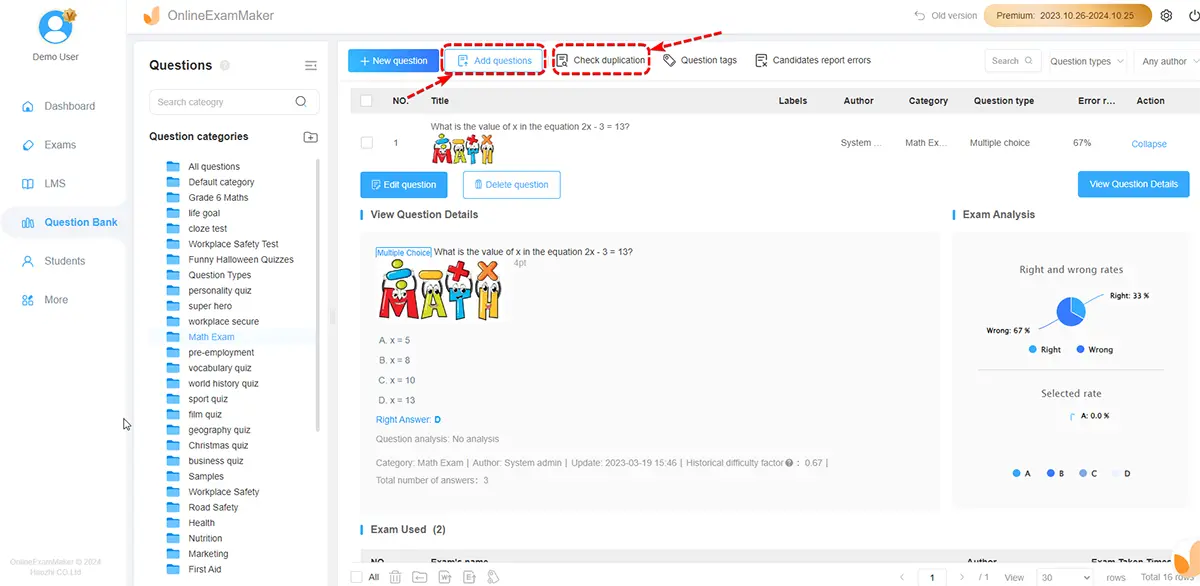
Continue to the Question Editor to start building your coding questions. You could create your own custom questions, checking for anything from basic syntax to more in-depth problem-solving skills. If you already have a large bank of questions saved up, you can do a bulk upload with an Excel file both for easy organization and storage in one place.
Step 3: Create a coding assessment and adjust quiz settings
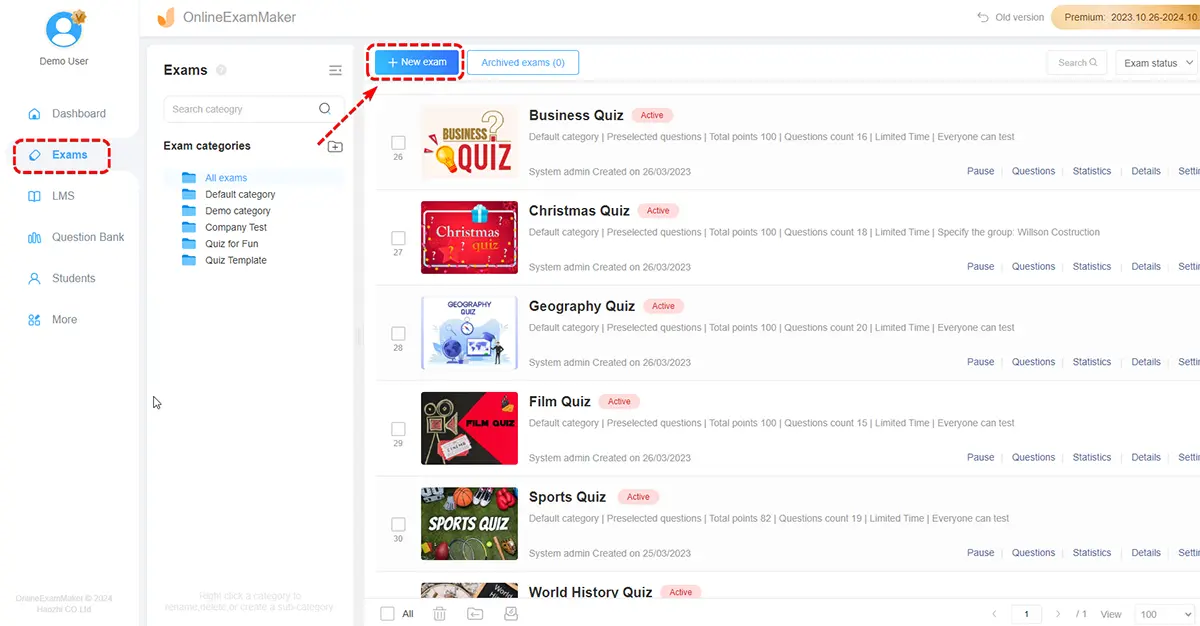
When your questions are in place, the next step is to create the coding test itself. OnlineExamMaker has customizable settings for time limits, difficulty, and even randomization. So, you are guaranteed your assessment reflects a certain desired level of skill and objectives. Now, you can click on Save and proceed to control the test’s difficulty settings in order to create a test which focuses on specific competencies.
Step 4: Share the quiz link to candidates
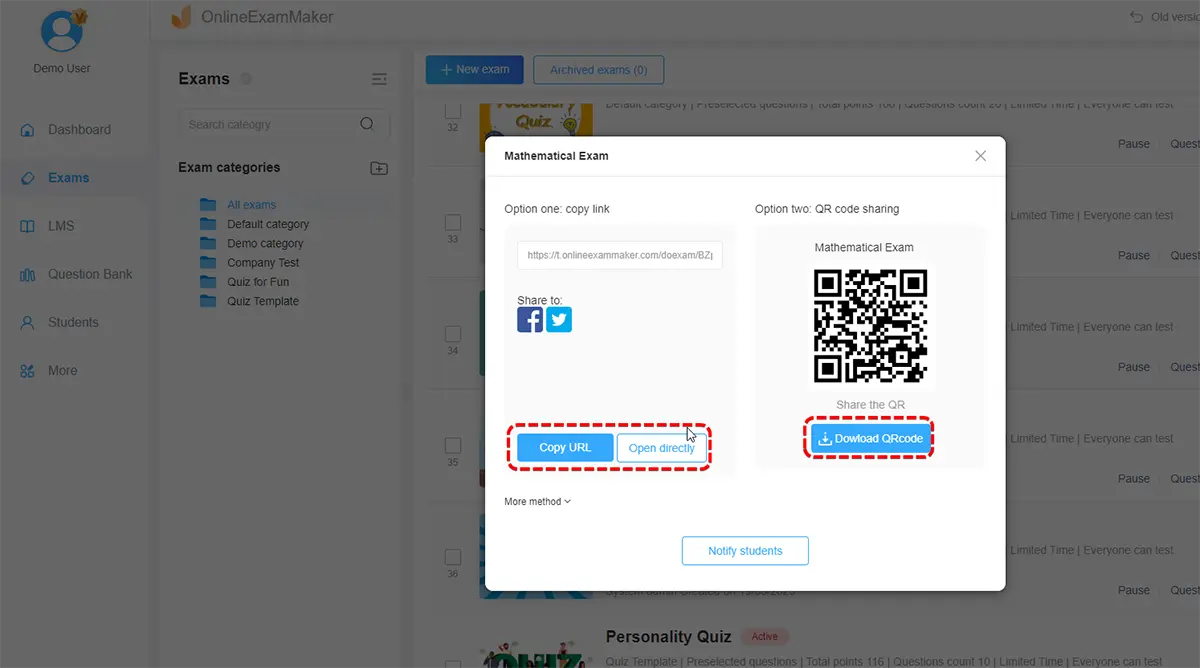
Easily share the quiz link through email, social media, or a link on your website. Candidates can take the quiz when it’s convenient. See them in real-time in the platform’s built-in analytics.
Step 5: Results Analysis and Reporting
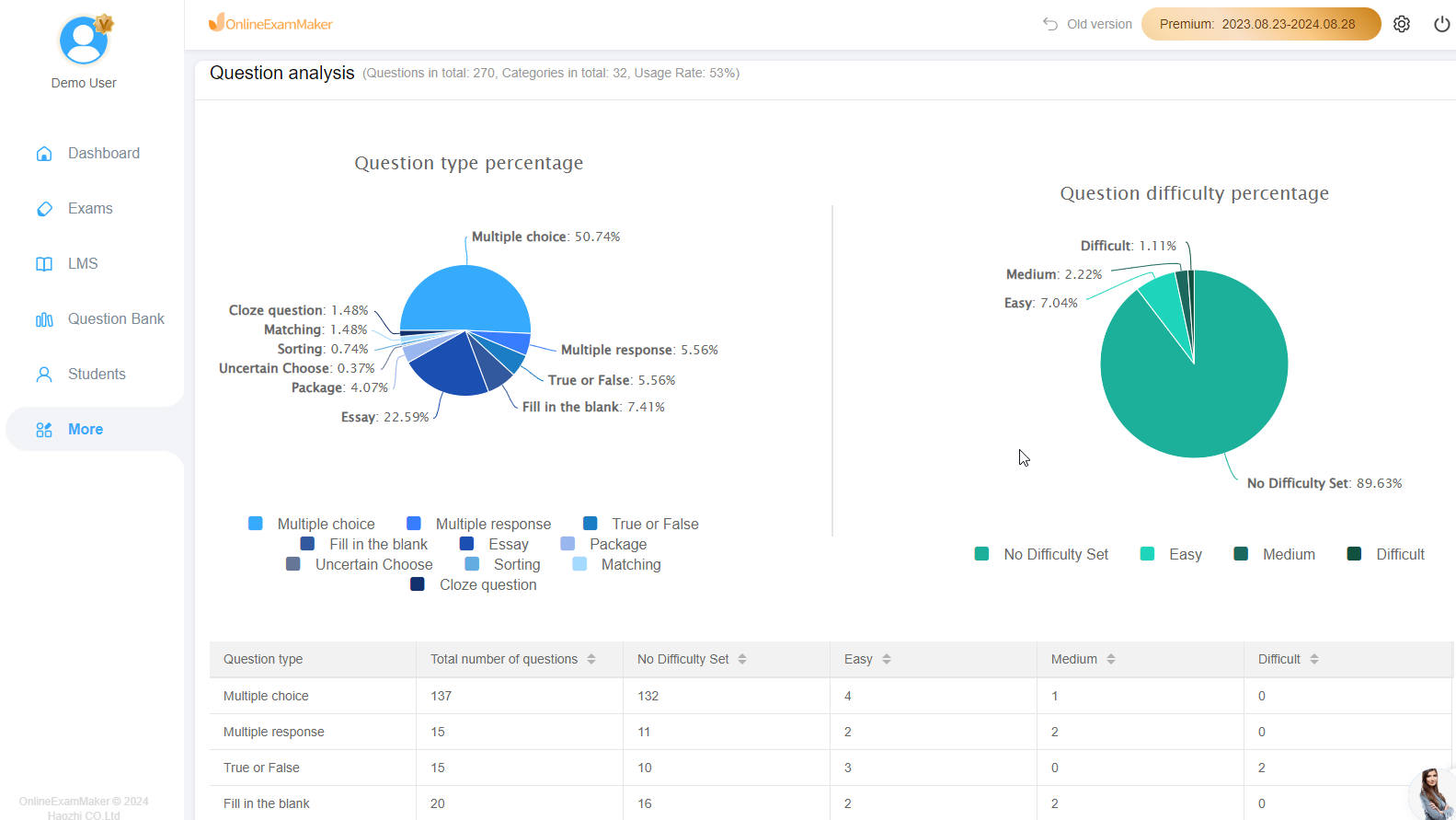
Once the quiz is submitted, the AI Grader of OnlineExamMaker will automatically score the quiz. You can have a look at the detailed performance reports from the “Statistics” section under the exam dashboard. This helps you look through the results and give the candidates feedback that is credible.